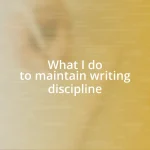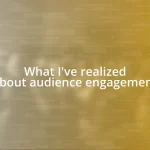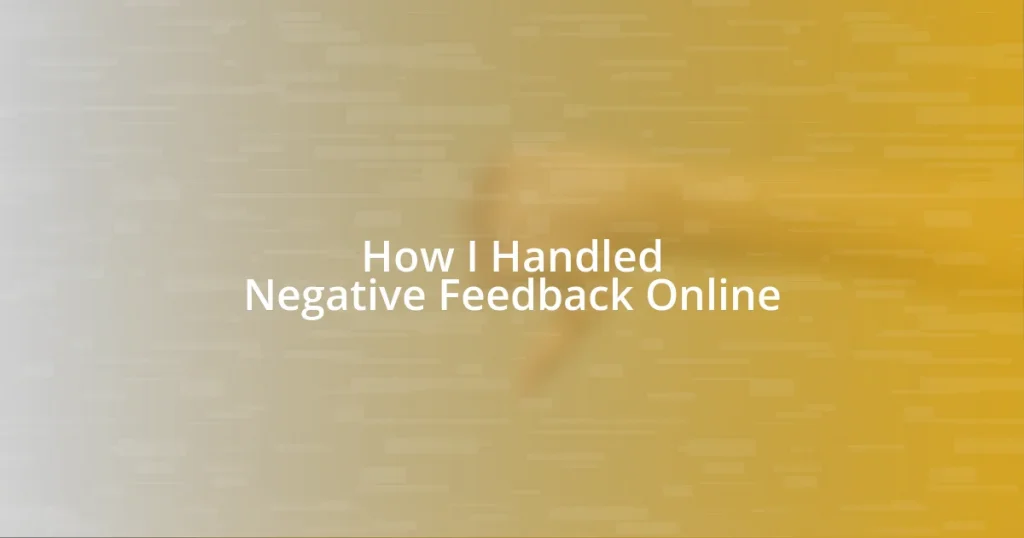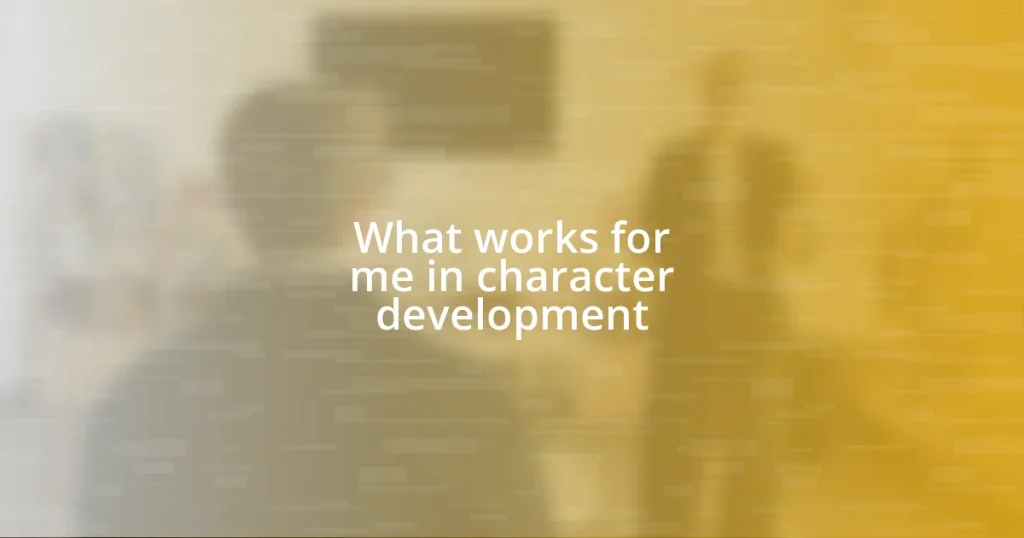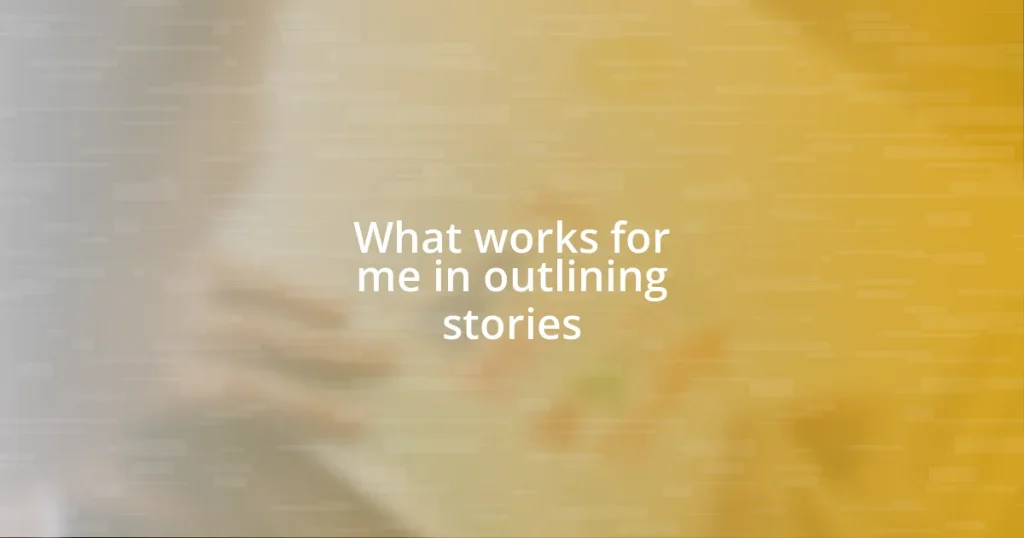Key takeaways:
- Negative feedback offers valuable growth opportunities and helps identify areas for improvement, requiring a shift in mindset to view critiques as constructive.
- Crafting thoughtful responses with empathy and clarity fosters constructive dialogue and can transform negative interactions into collaborative discussions.
- Building a supportive online community through transparency, acknowledgment of progress, and authenticity enhances trust and encourages open sharing of experiences and support.

Understanding Negative Feedback
Negative feedback can often feel like a punch to the gut. I remember receiving a harsh comment on a blog post I poured my heart into; it stung deeply, making me question my skills. Isn’t it interesting how a few words from a stranger can shake our confidence?
One thing I’ve learned is that negative feedback, while uncomfortable, offers a unique opportunity for growth. It invites us to reflect on our work and consider perspectives we might have overlooked. Have you ever noticed how a tough critique can sometimes shed light on areas we can improve?
Understanding the intent behind negative feedback is crucial. I’ve found that some feedback, though harshly worded, often stems from a place of frustration or passion. When I received critical feedback on my delivery style during a presentation, I realized the audience wanted more engagement. Isn’t it remarkable how shifting our mindset can turn a painful critique into a valuable lesson?

Recognizing the Value of Feedback
Recognizing the value of feedback can transform our perspective on criticism. Once, I received a disappointing review on a product I had developed. While my initial reaction was defensive, I eventually realized that the reviewer highlighted genuine usability issues. This insight drove me to make significant improvements that not only enhanced the product but also deepened my understanding of my audience’s needs.
It’s essential to see feedback as a goldmine of potential rather than a burden. I vividly recall a time when I shared a project draft that I believed was polished, only to be met with a barrage of suggestions. At first, I felt overwhelmed and even a bit defeated. However, once I sifted through the comments, I found actionable insights that not only improved my work but also forged stronger connections with my collaborators. Isn’t it fascinating how criticism can enrich our creations?
By recognizing feedback’s constructive nature, I’ve learned to embrace it much more readily. During a recent networking event, I had peers analyze my online presence. Initially, I braced for negativity, but their suggestions revealed blind spots I had never considered. What I took away from that experience was profound: every piece of criticism is a chance to evolve, both personally and professionally.
| Positive Feedback | Negative Feedback |
|---|---|
| Affirms efforts and achievements | Highlights areas for improvement |
| Inspires confidence and motivation | Encourages self-reflection and growth |
| Provides validation | Challenges comfort zones |

Preparing for Negative Comments
When I think about preparing for negative comments, I realize that it’s about fortifying my mindset before I hit “publish.” I’ve started anticipating critiques, which has helped me view them more objectively. I always remind myself: their feedback doesn’t define my worth; it provides clues for growth. This shift in perception makes a significant difference when those harsh words come rolling in.
To better equip myself, I’ve developed a few strategies:
- Practice self-compassion: I remind myself it’s okay to feel hurt at first. Allowing those emotions to settle is important.
- Set realistic expectations: Knowing that not every piece I create will be universally loved can soften the blow of negative comments.
- Stay focused on the goal: I always return to the purpose of my work, seeking encouragement from constructive feedback that leads to improvement.
- Seek out constructive criticism: Engaging friends or colleagues in reviews helps me normalize receiving critiques before facing a larger audience.
- Establish a support network: Connecting with fellow creators who understand the ups and downs of feedback can help me process emotions and gain perspective.
Having a toolkit makes navigating negative feedback feel less daunting and more manageable.

Crafting Thoughtful Responses
Crafting a thoughtful response to negative feedback is an art that combines empathy and clarity. I remember one instance where a user criticized a feature I was particularly proud of. Instead of retaliating or dismissing their concerns, I took a moment to thank them for their honesty, and then I asked for more details about their experience. This simple act of showing genuine interest not only alleviated their anger but also provided me with invaluable specifics to improve that feature. Isn’t it amazing how a little kindness can transform a situation?
Another thing I strive to do is to keep my responses focused and non-defensive. I often think of feedback as a dialogue rather than a confrontation. For instance, during an online discussion about my latest article, I made sure to acknowledge the valid points raised by my critics. Instead of getting caught up in emotion, I expressed appreciation for their perspectives and explained how those insights would guide my future work. It turned into a constructive conversation, which I never expected. Have you ever had a disagreement that ended up strengthening your relationships?
Finally, I’ve learned the importance of timing in my responses. Responding too quickly out of hurt or frustration can lead to mistakes. I let myself sit with the feedback for a day or two, just to gain perspective. I recently received a biting critique on social media, and my first impulse was to defend my choice of words. But pausing allowed me to reflect on what the commenter was saying. When I finally replied, my response acknowledged their feelings while gently clarifying my intent. This not only helped me maintain a professional demeanor but also opened the door for further discussion. How often do we rush to respond when taking a moment to breathe could lead to better clarity?

Turning Feedback into Improvement
Turning negative feedback into improvement requires a genuine willingness to evolve. I recall one particular review that stung — a reader pointed out that my writing occasionally lacked clarity. At first, I felt defensive. Yet, as I calmed down and reflected, I realized they were offering a chance to enhance my skills. That shift in focus made all the difference; it nudged me to work on clearer, more concise writing in my future projects. Have you ever had a realization that turned a sharp critique into a powerful lesson?
Equally important is the practice of analyzing feedback methodically. I started keeping a feedback journal, where I jot down all criticisms, whether big or small. I break down the comments to identify patterns and recurring themes — the specifics help me understand where I might be missing the mark. For example, when multiple readers mentioned my use of jargon, I knew it was time to simplify my language. This exercise has turned negative remarks into an invaluable roadmap for improvement. Isn’t it fascinating how writing down our thoughts can illuminate hidden insights?
Embracing feedback doesn’t end with acknowledgment; it’s about action. After incorporating suggested changes, I try to reconnect with those who provided feedback. I share how I implemented their ideas, often expressing gratitude that reinforces my growth journey. Recently, after revising a piece based on suggestions, I reached out to the reader who originally critiqued it. Their response was uplifting, confirming that engaging with feedback fosters not just improvement, but also a sense of community. How rewarding is it to transform feedback into a dialogue that enriches both parties?

Building a Supportive Online Community
Building a supportive online community is vital for creating a safe space where members feel encouraged to share their thoughts. One time, I joined a forum dedicated to a niche hobby of mine. Early on, I noticed a member who frequently offered constructive critiques without sounding harsh. Inspired by that approach, I started to emulate it in my interactions, which fostered a more open dialogue. Have you ever realized that a single positive voice can ripple through an entire community?
In my experience, transparency also plays a key role in building trust. When I encountered criticism, I often took the opportunity to share my process and the rationale behind my decisions. For example, I once posted about a project that didn’t go as planned, explaining the challenges I faced and how I was addressing them. The response was overwhelmingly supportive, with many community members sharing their similar experiences. It made me think—how can vulnerability pave the way for connection?
Additionally, I find that recognizing and celebrating small victories strengthens community bonds. After a long week of working through feedback on a project, I posted a short update celebrating the progress I made. The encouragement I received not only lifted my spirits but also ignited conversations where others shared their own successes and challenges. Isn’t it incredible how a little acknowledgment can transform a space into one filled with positivity and motivation?

Maintaining a Positive Online Presence
Maintaining a positive online presence requires consistent engagement with both supporters and critics. I remember launching a new project and receiving mixed reviews. While the constructive feedback stung at first, I chose to respond to every comment with gratitude and openness. It was heartwarming to see how acknowledging others’ input not only diffused any negativity but also encouraged a discussion that enriched the original post. Have you ever noticed how a simple “thank you” can pave the way for deeper conversations?
I also make it a point to share my successes, however small they may seem. After getting through a tough week, I created a post outlining my achievements, no matter how trivial, and invited others to do the same. The response was incredible; people started sharing their milestones, creating a wave of positivity. There’s something genuinely uplifting about celebrating progress together, isn’t there? It turns out that joy is even more infectious than criticism.
Moreover, I believe that authenticity is the cornerstone of a favorable online reputation. I have made it a habit to occasionally admit when I’ve made mistakes or learned something new. For instance, writing a candid post about an earlier article I published but later found problematic helped me connect with my audience on a deeper level. When I’m real about my missteps, it opens the door for others to do the same, fostering an environment of mutual support. Isn’t it liberating to know we’re all in this together, learning and growing as a community?





